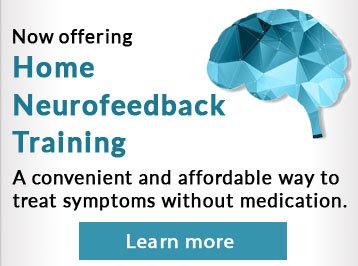Therapy for Children and Teens
Learn more about our medication free approaches to helping children and teens – Cognitive Behavioral Therapy (CBT), Parent Management Therapy (PMT), Biofeedback, Neurofeedback.
Cognitive Behavioral Therapy (CBT)
CBT for children and adolescents is a close ended, empirically supported treatment for a wide range of problems including depression, anxiety, behavioral difficulties, school refusal, disordered eating, and adjustment difficulties. CBT is grounded in the assumption that beliefs, behaviors, and emotions are interconnected. It is a collaborative, present-focused approach to problematic behaviors, thinking patterns, and emotions. Treatment includes parental participation and is most effective when the tools learned in therapy are practiced at home.
Parent Management Therapy
The goal of Parent Management Training (PMT) is to teach parents how to manage their child’s behavioral problems in the home and at school. Parents are taught how to define, observe, and record their child’s behavior at the beginning of treatment. Later, reinforcement and punishment techniques are taught in order to provide consistent consequences that aid in the reduction of negative behaviors.
Biofeedback
Biofeedback assists a child in managing a variety of health and emotional problems through muscle awareness and re-education. It is a painless, non-invasive technique for learning control of the processes of the mind and body. Instruments are used that give precise, immediate and meaningful auditory and/or visual feedback of the child’s physiology. Biofeedback is used to increase relaxation, relieve pain and the effects of stress while promoting healthy life patterns that can be fun and interesting to the child.
During biofeedback sessions, the specialist attaches sensors to the patient’s body which “feed back” information to a computer. This data graphically depicts physiological information such as muscle tension, skin temperature and breathing patterns. By observing these body signals, the biofeedback specialist can identify problem areas and determine appropriate therapies.
Neurofeedback
Neurofeedback is a type of biofeedback that teaches the patient to control their brainwaves. Neurofeedback is commonly provided using audio or visual cues, with positive feedback for desired brain activity and negative feedback for brain activity that is undesirable.The most accurate form of neurofeedback is guided by quantitative electroencephalography (qEEG), which is the analysis of a digitized EEG, also referred to as “Brain Mapping”. At Behavioral Associates we have the capability to perform neurofeedback therapy guided by the results of a qEEG which can be performed in our office.
The human brain emits electrical activity in waves that can be measured by a device called an electroencephalograph (EEG). When the results of an EEG are analyzed, scientists are able to identify certain brain wave patterns. There are several frequencies of brain waves when we are awake; these are called alpha (medium), beta (fast), and theta (slow) waves. Alpha waves are seen when a person is in a relaxed state, beta waves are present during concentration or mental work states, and theta waves are seen during times of drowsiness, daydreaming or light sleep (a fourth type of brain wave, called delta, is seen during deep sleep).
Anxious, stressed people have too little alpha and theta waves while children with ADHD often have increased amounts of these slower/daydreaming waves and an inability to access the faster beta waves needed for concentration. Training to decrease slow activity and increase fast activity has been performed successfully for over 25 years as treatment for ADHD and epilepsy. More recently, neurofeedback has been used to help with some of the symptoms of mild traumatic brain injury. Many clinicians are also reporting case studies in which the symptoms of depression have been alleviated through neurofeedback training (calming down the right front brain, and activating the left frontal lobe). There are countless effective applications of neurofeedback.
Getting Started at Behavioral Associates
The initial consultation is a 30 minute preliminary conversation between the parent and/or guardian and Dr. Robert Reiner, Executive Director, This session allows our program director to get a better understanding of your needs and goals in order to create a treatment plan. Please use the contact form or call us at (212) 860 8500 to schedule the appointment. We look forward to working with you!


